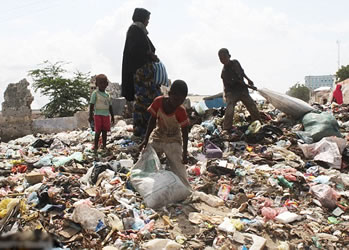A public health expert, Professor Folasade Omokhodion, has said that the lead level in Nigeria’s environment is unsafe for children, cautioning that it may result in decreased intelligence in children, behavioural difficulties and learning problem.
Professor Folasade Omokhodion stated this in a 2015/2016 University of Ibadan inaugural lecture she delivered entitled, “Danger, Men at Work: The Pitfalls, the Perils and The panacea”.
Omokhodion said that a significant proportion of children have blood lead levels of 10 micrograms per decilitre and above, indicating that the Nigerian environment is unsafe for children.
She declared: “A recent WHO report indicates that even blood lead concentrations as low as 5 micrograms per decilitre, which was once thought to be a “safe level “, may result in decreased intelligence in children, behavioural difficulties and learning problem.”
The Professor of Occupational Medicine and Community Medicine declared that lead exposure in children has more severe consequences than in adults, indicating that the toxic metal can also cause anaemia, hypertension and kidney impairment and toxicity to the reproductive organs.
Omokhodion while noting the increasing levels of lead in the blood among Nigeria’s population, despite the use of unleaded petrol, said this may mean that there are other significant sources of lead in the environment such as in food and beverages, soil, water and cosmetics.
She therefore stressed the need for a government agency to monitor exposures and body burden of heavy metals like lead in the general population over time to ensure necessary adjustments can be made in terms of policy and environmentally control measures.
The expert noted that people’s occupation can give a clue to health challenges they may face in life considering that at least half of a man’s waking hours are spent at work.
According to her, “If the work environment is healthy, workers are likely to be healthy. But if not, ill health and fatality can be associated with work.”
She stated that exposure to workplace hazards by artisans was found to lead to various work-related diseases, including noise-induced hearing loss, hand dermatitis, accidents, eye irritation and low back pain.
The incidence of malnutrition, she said, was also higher in working children, relating it to unreplenished energy expenditure while walking the streets.
Omokhodion therefore urged the Federal Government to focus more on the health of its working population, saying that it was an investment that will ensure a healthy and productive workforce.
She called for the establishment of an agency to serve the health and safety needs of workers across the country and prevent unnecessary occupational ill health and loss of man hours.
The inclusion of policies to make women’s work less hazardous into the National Policy on Occupational Safety and Health, she said, was required to protect women at work, support their participation in the labour force and protect the unborn child and children from participating in hazardous work.
WATCH TOP VIDEOS FROM NIGERIAN TRIBUNE TV
- Relationship Hangout: Public vs Private Proposals – Which Truly Wins in Love?
- “No” Is a Complete Sentence: Why You Should Stop Feeling Guilty
- Relationship Hangout: Friendship Talk 2025 – How to Be a Good Friend & Big Questions on Friendship
- Police Overpower Armed Robbers in Ibadan After Fierce Struggle






